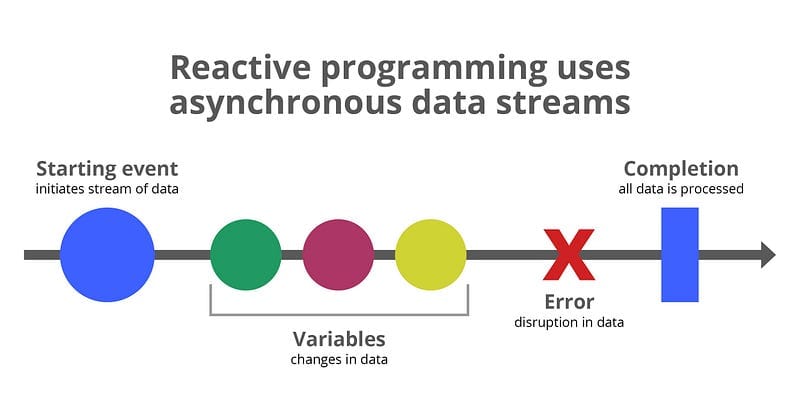Reactive Programming Principles explained
Reactive programming is a programming paradigm that focuses on constructing responsive and robust software applications that can handle…

Reactive programming is a programming paradigm that focuses on constructing responsive and robust software applications that can handle asynchronous data streams and change propagation, allowing developers to create scalable and more easily maintainable applications that can adapt to a dynamic environment.
In this article, we will delve into the principles of reactive programming, its benefits, and the techniques used to implement it.
Understanding Reactive Programming
In a reactive system, data flows through streams, which can be thought of as sequences of events over time.
Reactive programming revolves around the following principles:
a. Data Streams
Data streams are the core concept of reactive programming. They represent sequences of events that occur over time, such as user inputs, API calls, or sensor readings. Streams can be combined, filtered, and transformed to create new streams, which allows developers to build complex and dynamic applications.
b. Observables
Observables are objects that represent data streams. They provide a way to create, manipulate, and subscribe to data streams in a reactive system. Observables act as the bridge between the data source and the data consumers.
c. Observers
Observers are entities that subscribe to observables and react to changes in the data stream. They define the actions to be taken when new data arrives, or an error occurs. Observers can be considered the consumers of the data provided by observables.
d. Operators
Operators are functions that allow developers to manipulate and transform data streams. They can be used to filter, merge, or modify data streams, enabling the creation of new streams that cater to specific needs. Operators play a crucial role in shaping data flow in a reactive system.
Benefits of Reactive Programming
Reactive programming offers several advantages over traditional imperative programming models, including:
a. Improved Scalability
Reactive systems are designed to handle a large number of events concurrently. They are inherently more scalable than traditional imperative systems, which rely on blocking calls and threads to manage concurrency.
b. Enhanced Maintainability
Reactive programming promotes a declarative style, which helps developers express the application’s intent more clearly. This approach leads to cleaner and more maintainable code, making it easier to understand, modify, and troubleshoot.
c. Greater Responsiveness
Reactive systems are built to handle asynchronous events and can respond to changes more quickly. This characteristic leads to more responsive applications that can adapt to dynamic environments.
d. Robust Error Handling
Reactive programming enables more robust error handling, as errors are propagated through the data stream and can be handled centrally.
Implementing Reactive Programming
Several libraries and frameworks have been developed to facilitate reactive programming in various languages. Some popular options include:
- RxJS (JavaScript)
- RxJava (Java)
- Reactive Extensions (Rx) for .NET
- ReactiveSwift (Swift)
- Project Reactor (Java)
These libraries provide a rich set of tools and abstractions for implementing reactive systems, making it easier for developers to adopt this paradigm.
In summary, Reactive Programming is a powerful paradigm that enables developers to create scalable, maintainable, and responsive applications by focusing on data streams, observables, and observers, helping to build robust applications that can handle asynchronous events and adapt to dynamic environments.
Stay tuned, and happy coding!
Visit my Blog for more articles, news, and software engineering stuff!
Follow me on Medium, LinkedIn, and Twitter.
All the best,
Luis Soares
CTO | Head of Engineering | Blockchain Engineer | Web3 | Cyber Security | Golang & eBPF Enthusiast
#reactiveprogramming $programming #datastreams #asynchronous #observables #observers #eventdriven #architecture #design #application #softwaredevelopment #softwareengineering #backend #development #softwaredesign #security #technology #networking



